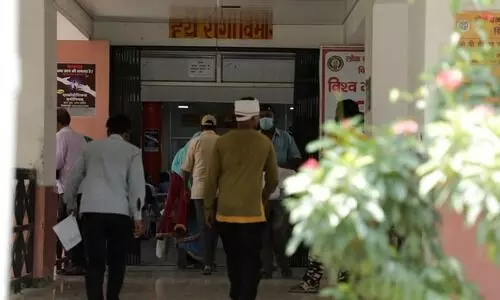While the unseasonal rainfall has cheered up the masses and brought respite from the scorching heat, it has also led to an unusual rise in the outbreak of water-borne diseases in the Uttar Pradesh capital.
When Gaon Connection visited Lok Bandhu Hospital in Alambagh locality to take stock of the typhoid outbreak in Lucknow, doctors substantiated that the cases of typhoid are on a rise in the city.
“The unseasonal rainfall has led to a rise in infections. Typhoid cases are being reported at this time of the year which is rare because these infections are generally observed during and after the monsoon rainfall arrives. There is an uptick in the cases of typhoid in our hospital by 20 per cent to 25 per cent,” Ajay Tripathi, general physician at the Lok Bandhu Hospital told Gaon Connection.
“Typhoid is caused by Salmonella typhi bacteria which can easily grow and multiply in warm weather. Once it is ingested it multiplies and invades into the bloodstream. The major reason for the spread of bacteria is the constant unhygienic handling of food, excreta, faeces and contaminated drinking water,” the doctor added.
According to the World Health Organization, an estimated 9 million people get sick from typhoid and 110,000 people die from the bacterial infection every year.
Meanwhile, the doctor also warned against self tests and to not use unsupervised or unprescribed medicines for a disease like Typhoid because that will probably do more harm than good to the patients. It can be treated by antibiotics though.
He underlined that prolonged fever, spots on the body, nausea and stomach ache are major symptoms for typhoid. Apart from these major symptoms some patients can also have additional symptoms such as having a rash and suffer from diarrhoea, weakness and headache.
If it is not treated well in time, the complications intensify and it could persist for a longer period and put one’s health at risk.
“However, we should not panic and reach out to the nearest government and district hospitals and primary healthcare centres.
The surge in cases of typhoid in this weather is quite common, however, medicines are available and using them on time will treat the patients efficiently,” the doctor said.
Dos and Don’ts
- Avoid eating roadside food as the food is kept in the open which could be infested by flies.
- Have home cooked food, green leafy vegetables, and fresh fruits.
- Always wear face masks while stepping out.
- Avoid having roadside beverages as the water used to prepare them could be contaminated. Drink boiled or filtered water.
- Intake of fluids should increase such as juices and ORS [oral rehydration solution].
- Prioritise personal hygiene.




















